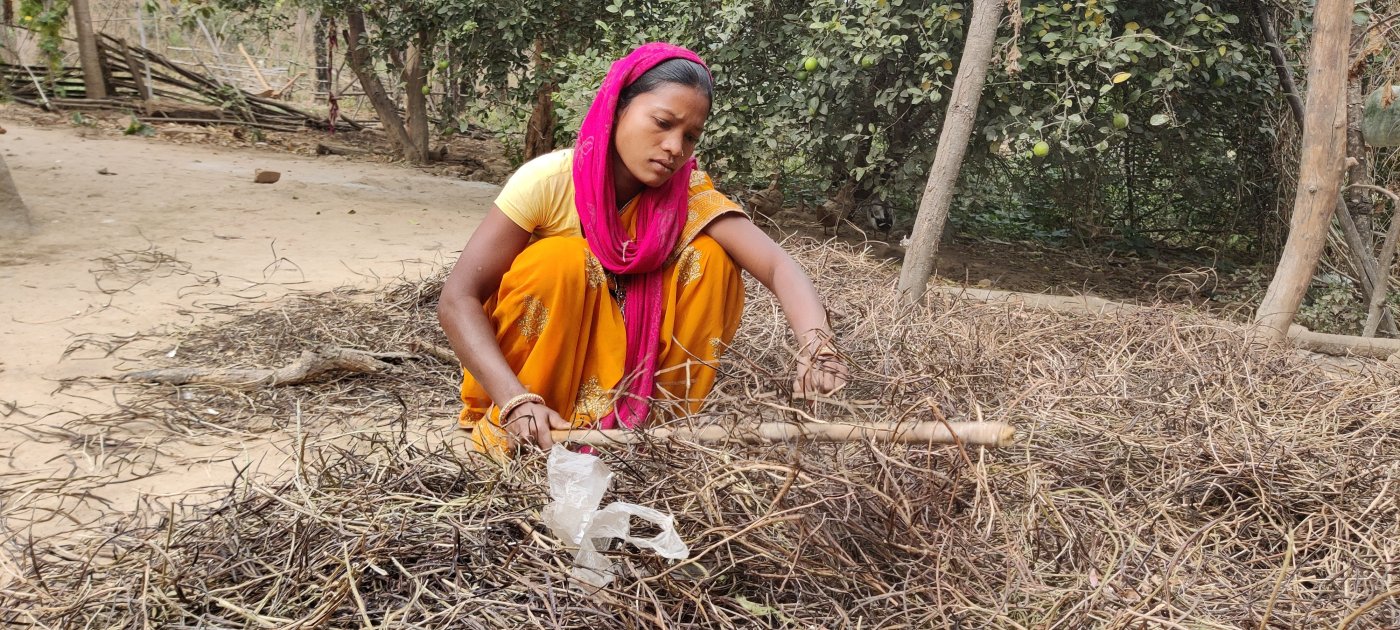Latehar, Jharkhand: Brahmdev Singh, 22, was one of six Adivasis on a traditional chicken hunt in the forests of this tribal-dominated district on 12 June 2021 when he was shot by security forces on a search operation for Maoists here in one of India’s poorest states.
His killing, which police said was not intentional, appeared deliberate because when he fell, he was dragged across a stream and shot again, according to eyewitnesses. No one was ever prosecuted.
More than two years later, based on a report by the crime investigation department (CID) of the Jharkhand police conceding that a police bullet killed Singh, the Jharkhand high court ordered on 14 August 2023 that his family be paid compensation within four weeks.
The court also ordered that the killing be reinvestigated by a team led by a senior police officer.
On 6 December 2023, a compensation of Rs 500,000 was finally given to Singh’s wife Jeeramani Devi by the Jharkhand government. On the reinvestigation of the crime, however, while a team under the superintendent of police of Latehar began its probe in December 2023, senior police officers refused to disclose its findings.
The incident took place around 7 am on the day of the Sarhul festival, when Brahmadev Singh of the Kherwar tribe, along with his uncle and four friends, went hunting in the forest located 200 m from their residence in a village called Piri in Ghasitola panchayat.
In his six-member group was his 24-year-old friend Govinder Singh.
Govinder Singh told Article 14 that local tribals undertake a traditional chicken hunt for years on the occasion of Sarhul, a spring festival, marking the start of a new year on an Adivasi calendar.
“A hen is released into the forest, then the tribals hunt it with their traditional weapons, such as a bow and arrow,” said Govinder Singh.
He said that as soon as the group entered the forest on 12 June 2021, security forces who were already in the forest suddenly started firing at them.
Frightened, the six young men raised their hands in surrender and announced loudly that they were not Maoists.
Panpatiya Devi, Brahmadev Singh’s aunt and also an eyewitness to the incident, said all the six including her husband started pleading, with their hands raised, asking the security forces to stop the firing.
Panpatiya Devi and Govinder Singh said Brahmadev Singh was closest to the firing, and was hit by bullets in his chest and thigh. As he collapsed, unconscious but alive according to the eyewitnesses, some security personnel—it was unclear at that point if the men were paramilitary or police—dragged him across a nearby drain, 150 m away.
Govinder Singh said that after taking him across the drain, the security personnel shot Brahmadev again, killing him. The remaining five then hid for about 30 minutes in Panpatiya Devi's house, which was soon surrounded from all sides by security personnel.
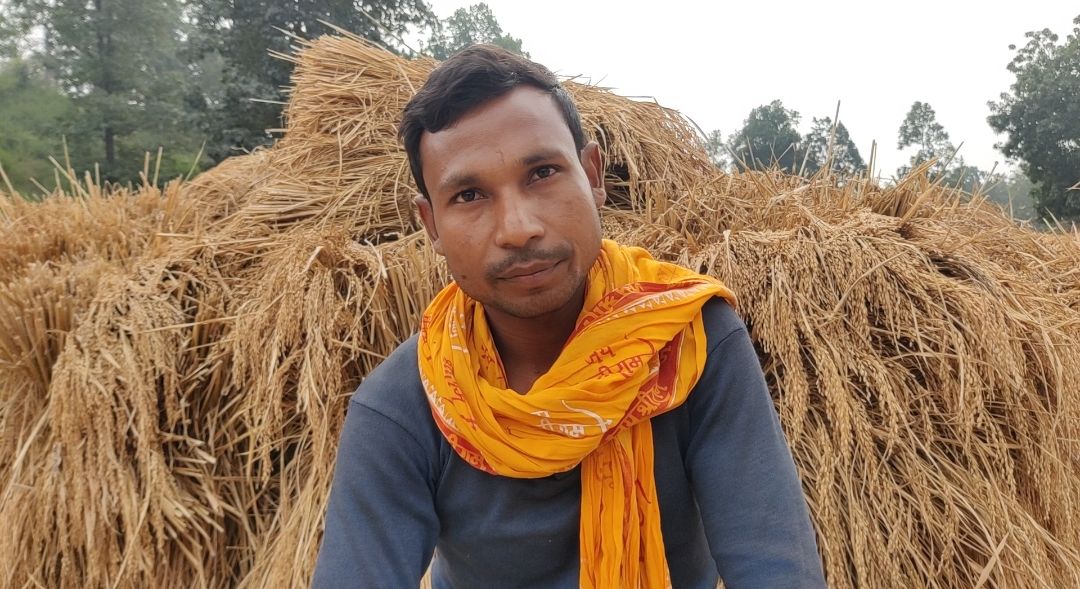
‘They Were Not Ready To Listen To Anything’
Panpatiya Devi said she thought presenting their Aadhaar cards would satisfy the personnel that they were not Naxal cadres, and she flung her and her husband’s cards in the direction of the men outside.
“The forces were not ready to listen to anything,” she said, “and all five men were brought out of the house.”
Govinder Singh said the men were stripped to their underwear and made to march to a hill outside the village. “There were five of us, me, Rajeshwar Singh, Dinanath Singh, Raghunath Singh and Shukuldev Singh,” he said. “The security personnel interrogated all of us there.”
After interrogation, the security personnel took the five men to Latehar police station, approximately 50 km away.
Panpatiya Devi said it appeared that the security personnel had hidden Brahmadev Singh's body in a pit. The incident caused a furore, and several hours later, trained dogs brought by the station house officer (SHO) of the local Garu police station began a search for the body.
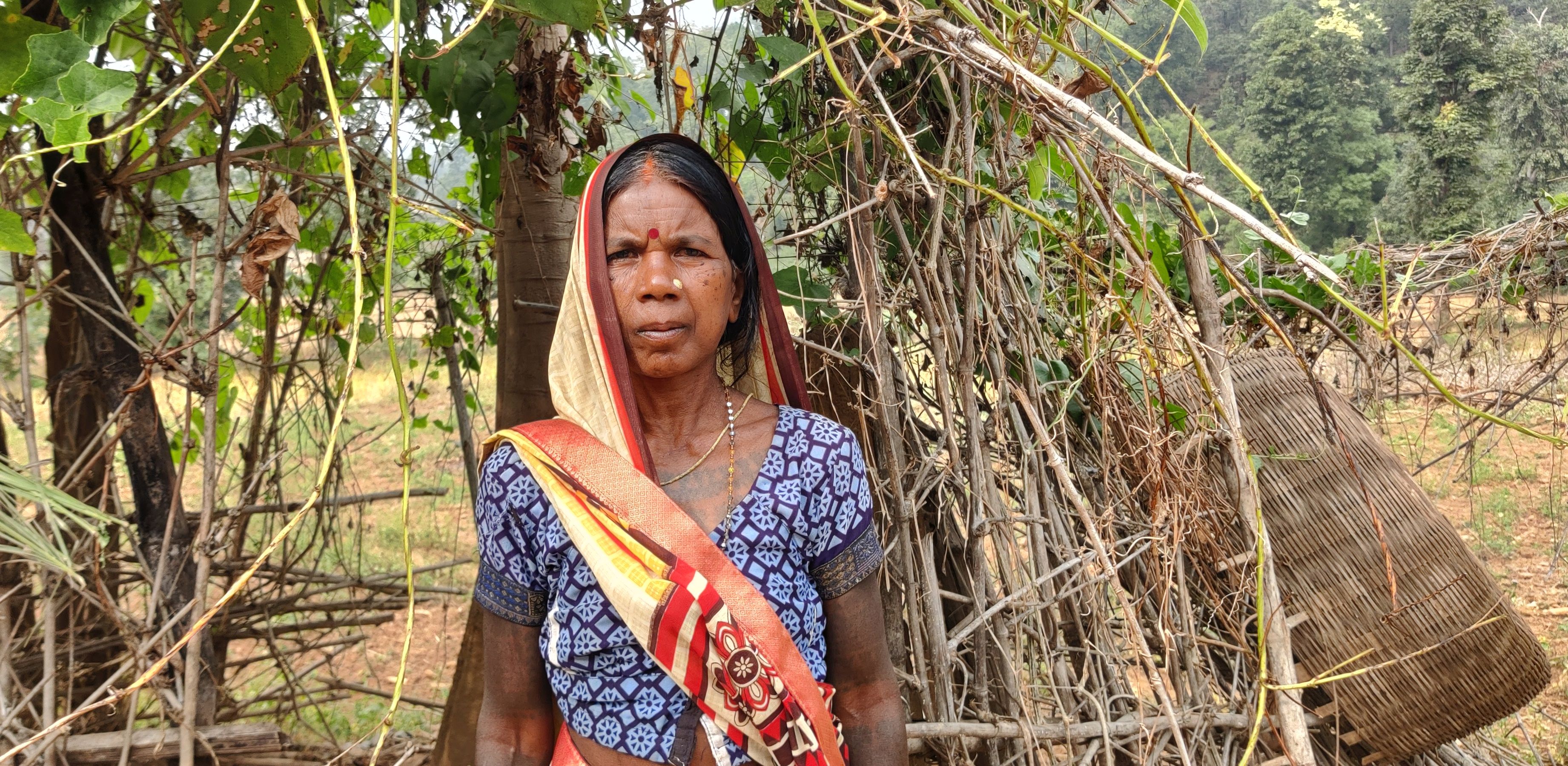
Jeeramani Devi, Brahmadev Singh’s wife, said she had heard the sound of gunfire coming from the direction in which her husband and his friends had gone. “Security personnel surrounded my house from all sides and did not allow me to come out,” Jeeramani Devi told Article 14. Until they emerged from their home, two to three hours later, the family did not know what had happened.
The circumstances of the Brahmdev Singh’s death, the arrest of the men who were accompanying him that day, and the eventual closure of the case against them for want of evidence, as well as Jeeramani Devi’s continuing fight for justice, are the latest fallouts of the Indian security forces skirmishing with Maoists in the central and eastern Indian states of Jharkhand, Chhattisgarh and nearby regions, killing more than 25,000 people over five decades.
Villagers like Brahmdev Singh have often found themselves caught in the line of fire. A 2015 report by Bagaicha, the non-profit started by Catholic priest Stan Swamy in 2006, found disproportionately large numbers of Adivasis, Dalit and other backward castes among those facing false cases of left-wing extremism,
Arrested in October 2020, Swamy died after just under nine months in prison at age 84, accused of terrorism.
It was on being alerted by Ranchi-based civil society organisation Jharkhand Janadhikar Mahasabha in November 2023 about the non-payment of compensation to Jeeramani Devi that Article 14 decided to travel to Latehar, 250 km west of Jamshedpur. Calls to the deputy commissioner, followed by the superintendent of police, however, did not yield concrete action and, over the next week, Article 14 contacted the inspector general of police and the home secretary, who also had no explanation for the delay in paying the compensation ordered by the HC.
After the director general of police confirmed that he had recommended paying the compensation, the chief secretary requested time to review the matter. The next day, the Latehar district commissioner issued the compensation cheque.
A Wife Seeks Justice For Husband’s Fake Encounter
According to Jeeramani Devi, her husband's body was found with the help of police sniffer dogs. It was sent to Latehar for a post-mortem.
“I made dozens of trips to Garu police station to lodge an FIR,” she said. The police station is 25 km from Piri. “But no FIR was lodged.”
Jeeramani Devi, frustrated at the lack of action, met the superintendent of police in Latehar, Prashant Anand, several times to register an FIR but in vain.
She said she approached other government officials in Ranchi, but these efforts also failed to elicit action.
Finally, in October 2021, she approached the chief judicial magistrate of the Latehar district court, who directed that a murder case be registered.
“However, the police sat tight over the matter,” a Jharkhand high court (HC) order of August 2023 would later say, “and the FIR was not registered in spite of the direction of the learned court.”
On 13 January 2022, the HC, hearing a writ petition filed by Jeeramani Devi, asked the Jharkhand state government to file a counter affidavit in the matter.
On 12 May 2022, the HC heard the matter again and, on the subject of non-registration of FIR despite the chief judicial magistrate’s order to do so, sought a supplementary counter-affidavit from the state government.
It was after the HC’s intervention that the Garu police station filed an FIR (Case 11 of 2022) against policemen for the killing of Brahmdev Singh, entrusting the case to the CID.
‘Mistake Of Fact, Lack Of Evidence’
The CID investigated both cases—this one and a previous FIR filed the day after the encounter, against the five villagers who had been hunting along with Brahmdev Singh.
The first was registered on 13 June 2021, a day after the incident, against Brahmdev Singh and the other five villagers under sections 307 (attempt to murder), 353 (assault or criminal force to deter public servant from discharge of his duty), 147 (rioting), 148 (rioting, armed with deadly weapon) and 149 (every member of unlawful assembly guilty of offence committed in prosecution of common object) of the Indian Penal Code (IPC), 1860, and 25(1-B)A-27/35 of the Arms Act, 1959.
The FIR said the villagers fired their weapons while hunting animals in the forest, alerting a police special operations team that was conducting a search operation for Naxalites. Brahmadev Singh died in retaliatory firing, it said, adding that the other men threw their guns near a drain and ran away.
During a subsequent search by the police, the five accused were interrogated, and guns seized from them.
In Jeeramani Devi’s submissions to the court, she mentioned that the hunting party used a ‘bhartua gun’, a locally made gun that has to be filled with gunpowder before it is fired, firing only a single shot, used mainly to hunt small animals or to scare away wild animals that damage crops.
The CID investigation report in this case said that during the course of the investigation, it could not be proved that the recovered guns belonged to the accused, and charges against them could not be established.
As “concrete and sufficient evidence” was not found in the chargesheet against the accused, a final report citing ‘lack of evidence” was submitted on 10 August 2023 and the case closed.
When the HC sought a progress report on the CID’s investigation into the case filed in 2022, a supplementary counter affidavit filed by the state government admitted that Brahmdev Singh died upon being hit by a police bullet.
This case, invoking sections 302 (murder), 201 (causing disappearance of evidence of offence, or giving false information to screen offender) and 34 (acts done by several persons in furtherance of common intention) of the IPC, was filed against one named police officer, seven unnamed team-members and about 100 personnel.
The CID told the court the case was closed, calling it a ‘mistake of fact’.
‘WIll Compensation Bring Back My Husband?’
On 14 August 2023, the HC ordered that the state should pay a sum of Rs 500,000 to Jeeramani Devi within four weeks of the order.
Months passed without the promised compensation.
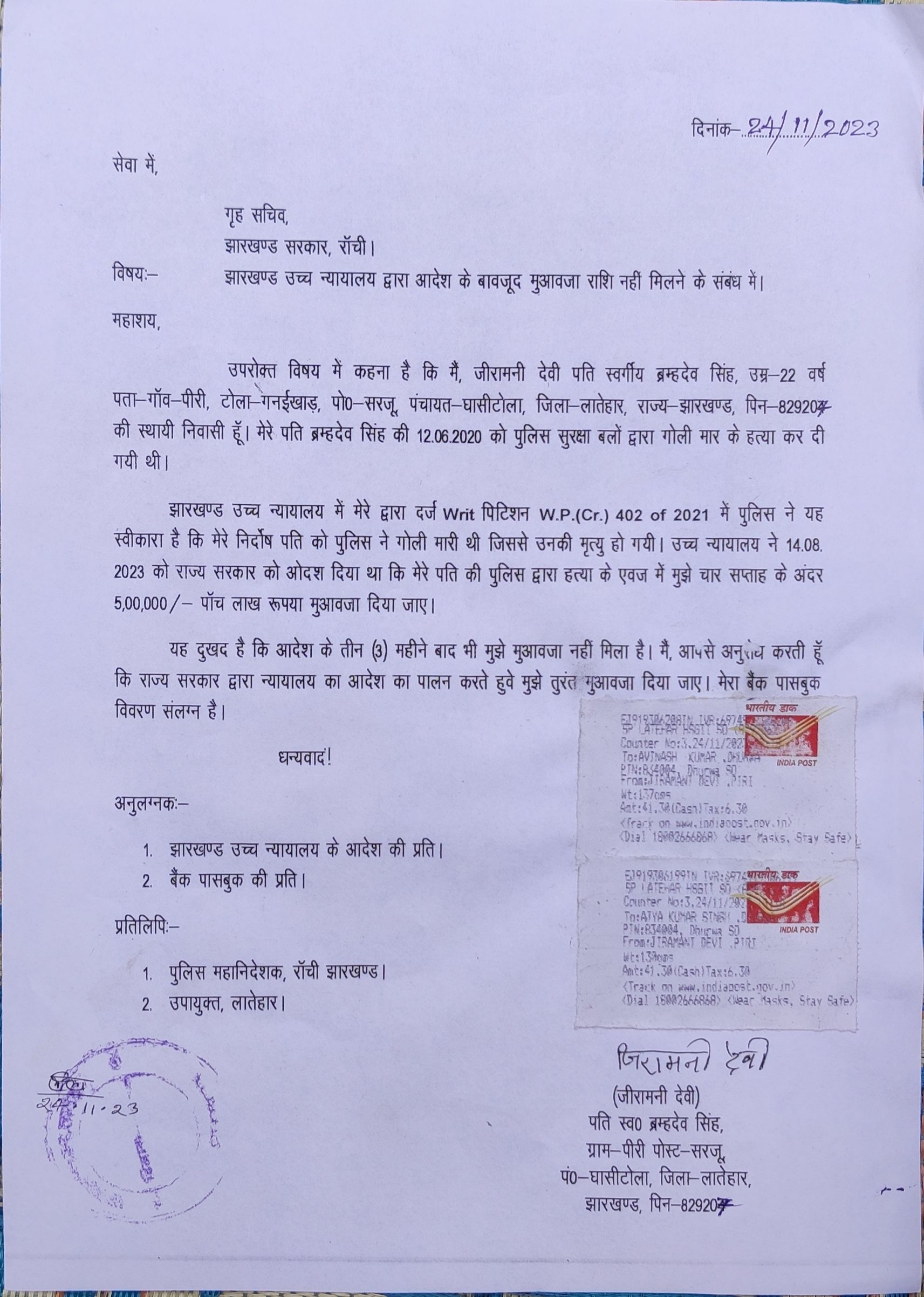
On 23 November 2023, Jeeramani Devi wrote to the Jharkhand chief secretary, Sukhdev Singh. Eventually, Latehar deputy commissioner Himanshu Mohan handed over a compensation cheque for Rs 500,000 to Jeeramani Devi on 6 December 2023.
Widowed at 22 years, Jeeramani Devi fought back tears as she asked, “Will my husband be brought back to life with this Rs 5 lakh?”
She said the sum was not adequate compensation for the death of her husband. “When he was alive, he used to earn more than Rs 500 a day as a driver.”
Brahmdev Singh earned a living as an auto driver, ferrying passengers from his village to Latehar town and back.
Jeeramani said a mountain of challenges stood before her. Unsure how to earn a livelihood and raise her two-year-old son Prince, she said she would have been grateful for a government job instead. She had studied up to high school, she said.
Court Orders Reinvestigation Of Encounter Killing
Jeeramani Devi’s petition to the HC said an eyewitness to the encounter had seen Brahmdev falling to a bullet and being dragged across a stream while still alive, his hands and feet trembling.
He was shot again on the far side of the stream, the court was told. Villagers also noted later that Bramhadev Singh’sclothes had been changed by the police personnel, and his body was found wearing a pair of blue jeans and yellow t-shirt, viewed as “a part of cover-up”.
The HC said that the incident merited “at least” a case under section 304 (death caused by negligence) of the IPC. “… however, the CID has chosen to come to the conclusion to give a clean chit to the erring police officials,” the HC said, setting aside the CID’s closure report, which it called a “hasty action”, and ordering a reinvestigation.
The court ordered that a fresh team of Investigators be constituted by the director general of police and the secretary of the state’s home department, under a senior officer. The court said this team should consist of “efficient personnel, well conversant with the use of modern investigation technology,” and that it should not include any officer who was part of the CID’s investigation team that filed a closure report.
The court directed that the fresh investigation be concluded within a maximum period of three months from the date of the order, in August 2023.
Article 14 contacted Latehar superintendent of police Anjani Anjan to enquire about the status of the reinvestigation. He said he did not have permission from his headquarters to comment.
Article 14 also contacted Palamu deputy inspector general Rajkumar Lakra on 28 November 2023. He said the case had been transferred to the CID.
Director-general of the Jharkhand police CID, Anurag Gupta, said he had recommended a compensation of Rs 500,000 to the family of Brahmdev Singh. He asked that we send questions on the reinvestigation of the case and the investigation report to the CID’s investigating officer, police inspector Mohammad Farooq.
Farooq told Article 14 that the firing was done by personnel of the Jharkhand Jaguars, a special anti-Maoist force of the Jharkhand police raised in 2008. At the time of the encounter, no policemen from the local Garu police station were present at the spot.
“As far as the firing done by them is concerned, security forces do not intentionally fire at anyone,” said Farooq.
The inspector further said that forces may have assumed a group with weapons to be militants. “If they were celebrating the Sarhul festival, then the police should have been informed about it in advance so that security forces do not conduct anti-Naxalite search operations in the area,” he said.
Regarding the recovery of arms from the accused, Farooq said the police recovered elephant repellent guns from these, but these had not been recovered directly, and hence lacked evidentiary value.
On the antecedents of Brahmdev Singh and his five friends, Farooq conceded he had found no previous criminal case against them.
When Article 14 contacted Palamu IG Rajkumar Lakra once again on 6 February 2024, he said that a team had been formed over a month earlier, including a superintendent of police, a deputy superintendent of police and two inspectors.
Lakra said departmental action was taken against two persons but refused to elaborate on what action was taken.
Victim’s Mother Labours In Bihar’s Paddy Harvest
There is a paved road leading to the government middle school located at the beginning of Piri village in Ghasitola panchayat, 50 km west of Latehar town. From there, an unpaved road leading to a hamlet called Ganaikhaad, 3 km from the school, reaches Jeeramani Devi's house after it crosses a small river emerging from the hills. The road is treacherous for walking or riding a two-wheeler.
Jeeramani Devi was diligently collecting the edible seeds from the pods of a local wild-growing vegetable named chakor, by beating the pods with a stick.
Jeeramani Devi said chakor, which grows in the forest, is eaten by local tribals and also sold. “By selling its seeds at the end of the season, one can earn about Rs 250,” she said.
Jeeramani Devi’s parents wanted to take her back to her maternal home after her husband’s killing, but she chose to stay back with her baby boy and her ageing mother-in-law. In 2023, her father-in-law passed away and a brother-in-law migrated elsewhere with his family.
“Old age is an age of rest, but my mother-in-law is currently away at the paddy harvest in Dehri, Bihar,” Jeeramani Devi said. Dehri is in Rohtas district, about 185 km north of Latehar.
Her mother-in-law is about 60 years old, she said. The wages and the paddy she returns with will be key for their subsistence for the rest of the year.
The mud home with a broken tiled roof was to have been replaced with a better home under the Pradhan Mantri Awas Yojana (PMAY), a showcase housing-for-all project of the central government.
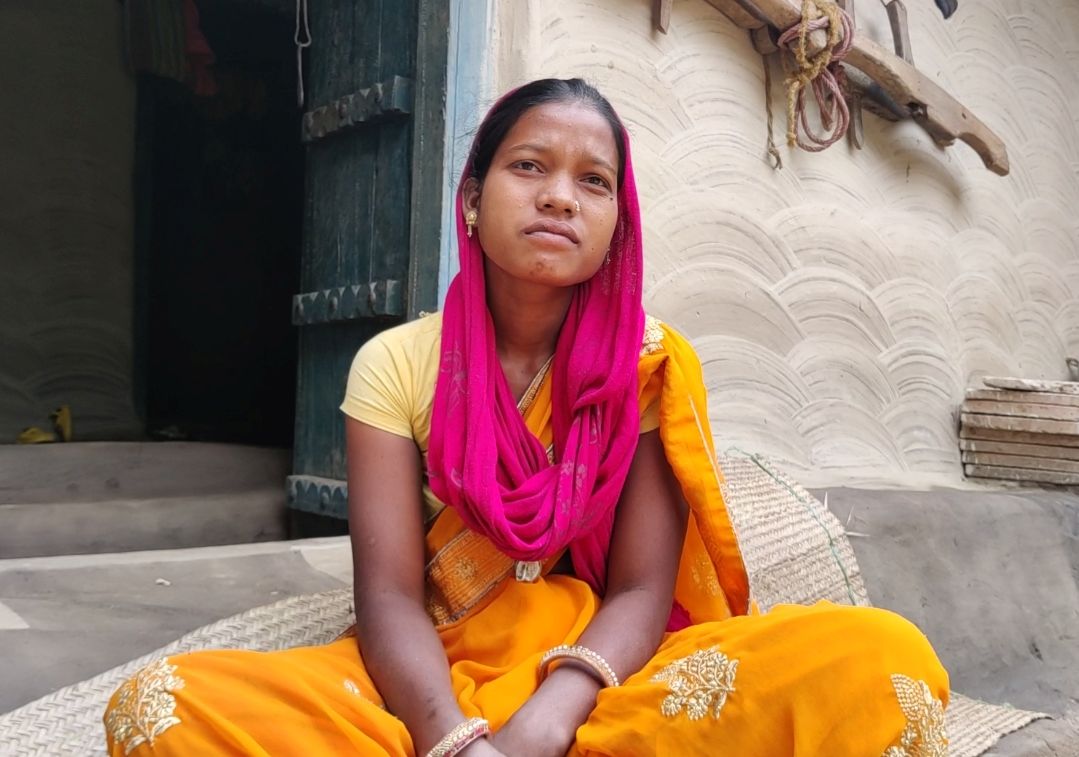
However, the new house remained incomplete, with the subsidy payment not coming through fully. The single room structure given to her as a beneficiary of the PMAY does not have a kitchen or a toilet. Jeeramani Devi said she fears she will never be able to complete building the house as there are no earning family members.
Local sarpanch (an elected representative who heads the village) of Piri village, Pramila Devi, admitted that Jeeramani Devi's house could not be completed due to non-availability of funds, but said a toilet would be built once the house was completed.
According to Pramila Devi, only 15 toilets were constructed in Piri village, which has around 100 families residing. She added that along with a deep borewell, a water tank was installed to provide water supply to Jeeramani Devi's house.
Jeeramani Devi countered that the tank was broken when it was installed, and it could never store water.
She said she continues to cook food on a wood stove, and did not know about the Pradhan Mantri Ujjwala Yojana (PMUY) for safe cooking fuel.
Pramila Devi said nobody in the village had received Ujjwala gas connections. “We are trying,” she said.
About the pension scheme for widows, Pramila Devi said Jeeramani Devi and her mother-in-law were each receiving Rs 1,000 per month.
(Mohammad Sartaj Alam is an independent journalist based in Lucknow.)
Get exclusive access to new databases, expert analyses, weekly newsletters, book excerpts and new ideas on democracy, law and society in India. Subscribe to Article 14.

